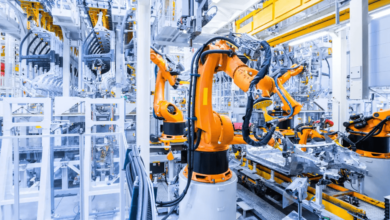Winding Machines: The Backbone of Modern Manufacturing

Winding machines are the unsung heroes of modern manufacturing. They quietly transform raw materials into complex components that power everything from airplanes to medical devices and energy storage systems. As industries evolve, so do the techniques and technologies behind motor winding. The precision and efficiency of these machines play a crucial role in ensuring high-quality outputs.
Whether you’re involved in aerospace, healthcare, or renewable energy, understanding the significance of motor winding technology can lead to enhanced productivity and innovation. Join us as we explore advanced winding techniques, industry-specific applications, and the exciting evolution of this vital machinery. Dive into how these advancements are shaping the future across multiple sectors!
The Importance of Winding in Different Industries
Winding plays a crucial role across various industries, serving as the backbone for many applications. In aerospace, precise motor winding ensures reliability and efficiency in flight systems. Each component must be expertly constructed to withstand extreme conditions.
The medical industry also relies heavily on advanced winding techniques. Devices like MRI machines and surgical robots depend on high-quality windings for optimal performance. Any failure can have serious consequences.
Energy storage is another sector where effective winding is essential. Batteries require meticulous design to maximize capacity and lifespan. Poorly wound components can lead to inefficiencies or even safety hazards.
As industries evolve, so do their demands regarding winding technology. The need for precision has never been greater, driving innovation forward at a rapid pace. This highlights the significance of investing in top-notch winding solutions tailored to specific needs.
See also: Fast, Sustainable, and Stylish Thesis Printing in Italy
Advanced Winding Techniques for Optimal Results
Advanced winding techniques have revolutionized the manufacturing landscape. These methods ensure precision and efficiency in motor winding.
One of the pivotal technologies is automated winding. This approach minimizes human error while maximizing speed. Machines equipped with advanced sensors can adjust parameters on-the-fly, ensuring tight tolerances are met consistently.
Another technique gaining traction is multi-layered winding. This method allows for higher density coils, which leads to improved performance in electric motors. By optimizing the number of layers, manufacturers enhance both thermal management and electrical efficiency.
Industry-Specific Machine Applications
Winding machines find diverse applications tailored to specific industries. In aerospace, precision is paramount. These machines create lightweight coils essential for advanced propulsion systems and avionics.
The medical sector demands rigorous standards too. Here, winding machines produce vital components like pacemaker inductors and MRI coils. Accuracy ensures patient safety and device reliability.
Energy storage relies on efficient winding techniques as well. Battery manufacturers utilize these machines to design intricate battery packs that enhance performance and longevity.
Each industry has unique requirements that drive the development of specialized winding technologies. This focus ensures optimal functionality across various applications while maintaining high-quality output suitable for critical tasks.
As businesses strive for innovation, understanding these industry-specific applications becomes increasingly important in selecting the right motor winding solutions.
Evolution of Winding Technology
Winding technology has seen remarkable transformations over the years. Early machines relied on manual processes, limiting precision and speed. As industries evolved, so did the need for automated solutions.
The introduction of computer numerical control (CNC) revolutionized motor winding. This innovation allowed for intricate designs and improved repeatability in production runs. Manufacturers could now achieve tighter tolerances than ever before.
With advancements in materials science, new composites have emerged that enhance durability and performance. These materials are lighter yet stronger, catering to industries like aerospace where weight is critical.
Today, smart technologies play a vital role in winding operations. Machines equipped with IoT sensors monitor performance in real-time, enabling predictive maintenance and minimizing downtime. This shift towards automation not only boosts efficiency but also improves product quality significantly across various sectors.
Case Studies: Successful Implementation of Winding Machines in Aerospace, Medical, and Energy Storage Industries
Aerospace manufacturers have harnessed the precision of winding machines to create lightweight components that enhance fuel efficiency. For instance, a leading aerospace company utilized advanced motor winding techniques to produce high-performance electric motors. This innovation not only improved aircraft reliability but also contributed to reduced emissions.
In the medical field, a prominent device manufacturer adopted specialized winding machines for their imaging equipment. These machines ensured tight tolerances in coil production, resulting in clearer images and better diagnostics for patients. The enhanced efficiency led to quicker turnaround times in hospitals.
Energy storage systems are another area benefiting from sophisticated winding technology. A renewable energy firm integrated automated winding processes into their battery production line, significantly increasing output while maintaining quality standards. This development has played a key role in advancing sustainable energy solutions globally.
Future Developments in Winding Technology
The future of winding technology holds exciting possibilities. Innovations are emerging that promise to enhance efficiency and precision in motor winding processes.
Automation is at the forefront of these developments. Advanced robotics can perform intricate tasks with a level of accuracy unattainable by human hands. This leads to faster production cycles and reduces labor costs.
Conclusion
Investing in a quality winding machine is essential for multiple industries, including aerospace, medical, and energy storage. The precision and efficiency these machines offer can significantly impact production quality and operational costs.





